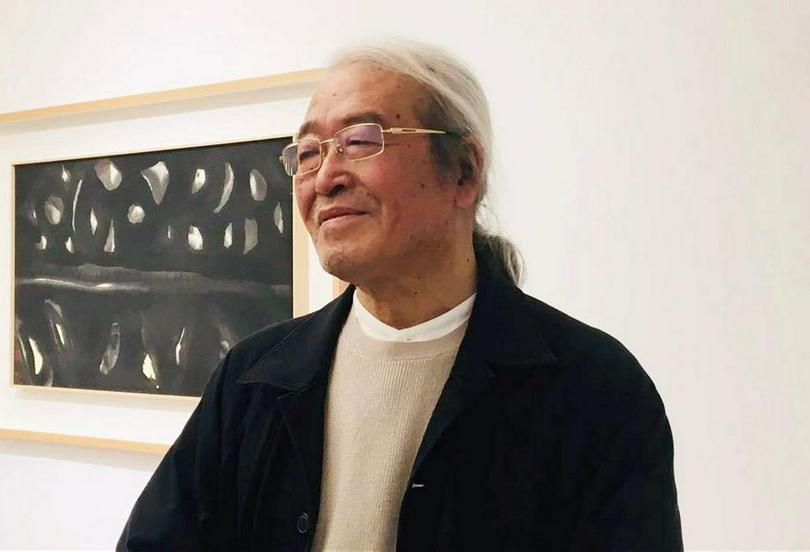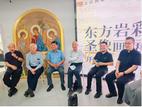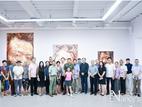At 7:20 a.m. on September 1, 2025, Daozi (given name: Wang Min), contemporary art critic, painter, poet, artist, and professor at the Academy of Arts & Design at Tsinghua University, passed away in Beijing from leukemia at the age of 69.
Daozi was diagnosed with leukemia in early June and received treatment in Beijing. On August 27, his condition deteriorated rapidly, marked by a sharp increase in white blood cell count, persistently low blood counts, and multiple organ failure, leading to his admission to the ICU. The next day, on August 28, Christians issued an urgent appeal for blood donations on his behalf. He passed away on the morning of September 1.
An obituary posted on Daozi's WeChat Moments that same day read: "Dear Teacher Daozi passed away peacefully in his sleep this morning. He was called back to the Lord and has entered into eternal rest from his earthly labors."
Daozi's Life
Born in Qingdao on November 26, 1956, Daozi graduated from Northwest University and Beijing Normal University with a Bachelor of Arts and a Master of Arts in Literature. His career spanned teaching fine arts, conducting research in visual arts, writing art criticism, composing poetry, and curating exhibitions. He previously served as deputy editor-in-chief of "Chang'an," a monthly literary magazine published by the Xi'an Federation of Literary and Art Circles; professor and dean of the Fine Arts Department at the Sichuan Fine Arts Institute; and vice chairman of the Chongqing Literary Critics Association. He was a member of both the Chinese Aesthetics Association and the International Aesthetics Association and serves as a professor at Tsinghua University.
Daozi first gained recognition in the 1980s for his "metaphysical" style poetry. In the 1990s, he shifted his focus to art history research. Both his poetry and art theory have exerted influence in China and abroad, earning him international poetry awards.
Since 2000, he has pioneered what he calls "Saintism Ink-Wash Painting," blending his Christian faith with traditional Chinese ink painting to produce significant works. In 2015, his piece "God and Gold" received the 20th Misereor Foundation for Social Development. The work was reproduced on more than 3,000 large-scale canvases and displayed on over 3000 church altars across German-speaking countries and Europe during Pentecost.
Daozi often stated that his art reflected his convictions and ideals. He maintained that the defining feature of his work was its innovative form of expression and narrative. He emphasized repeatedly that "Saintism Ink-Wash Painting" was not religious art in the conventional sense, but spiritual art, expressing a pursuit of ultimate values and spiritual orientation.
In recent years, Daozi stressed the importance of advancing Christian art by connecting with real life, human experience, and history. He believed that only in this way could Christian art convey a genuine sense of reality and authenticity.
Daozi's Saintism Ink-Wash Painting—A Unique Phenomenon in Contemporary China
At the exhibition "Daozi—The Recurring Commencement," renowned artist Ding Fang described Daozi's art as a unique phenomenon in contemporary China. He noted that Daozi "persists in his spiritual pursuits and inner confessions," characterizing his work as "a fusion of universal poetics and theological aesthetics." According to Ding, Daozi's faith "should not be simply categorized as Western Christianity, as it is rooted in the ancient East, sustained by a profound and enduring force, symbolized by the apostolic and patristic era." He further observed that Daozi's artistic language is "profoundly rich, successfully transforming traditional Chinese ink painting techniques into a poetic expression of theological aesthetics."
Celebrated painter and literary critic Chen Danqing also highlighted the iconographic elements of Daozi's ink paintings. He pointed to recurring motifs such as "the sun, the head, the sea, the candle, and wings in various forms," asking whether these were Daozi's favored images or even central themes. Chen then reflected on the biblical influence underlying these symbols: "At this point, the Bible looms. The Bible, far from merely pointing to religion, is a perpetual resource for artists, verbal, imaginative, boundless, transcending time. It is a path discovered when all others seem closed. The Bible is remarkably 'concrete.' When Daozi suddenly received the promise of painting beyond poetry (and must have been overjoyed to see his first painting completed), the Bible immediately fulfilled that promise, enabling him to discover another self."
The Art Community and Christians Mourn Daozi's Passing
Daozi's death prompted an outpouring of grief from both the art community and Christians, who expressed their shock and sorrow at his passing and prayed for his peaceful rest.
The China Annual Art Critics Assembly issued a statement: "Mr. Daozi's passing is a great loss to the assembly and to the Chinese art community. All members collectively mourn Mr. Daozi. May he rest in peace."
Renowned art critic Jia Fangzhou recalled a dinner with Daozi in early August, noting that he was then in good health and enjoyed his meal. "Mr. Daozi devoted many years to art research and achieved great success in teaching. Many of today's young critics were his students. I am deeply saddened by his passing. May Mr. Daozi rest in peace," Jia said.
A Christian named Olive (online alias) shared that she had been browsing Daozi's works late into the night before his death. Calling him "a glimmer of light in the wilderness," she lamented his passing: "How I wish a miracle had happened so he could continue creating more spiritual works."
Christian playwright Jiang Yuanlai also extended condolences to Daozi's family. He said, "I will continue to recommend Daozi's remarkable works, especially his icon paintings, in my lectures. His works have already taken root in many churches and will be passed down for generations."
Art critic Dr. Hao Qingsong, who witnessed Daozi's final days, described him as remarkably composed in the face of illness and death. "We know he endured many hardships in life, yet he always remained calm," Hao said. "It is like Jacob, who told Pharaoh of Egypt, 'My years have been few and difficult,' yet still blessed Pharaoh with great composure."
Reflecting on Daozi's legacy, Hao added: "He was an accomplished poet, an influential art critic, and a leading advocate of Christian art. Guided by the principles and manifestos of Saintism Ink-Wash Painting, he created outstanding works of Christian art. He also devoted decades to teaching, and nearly half of China's young art critics were once his students."
"Most importantly, his faith in God transformed his life," Hao emphasized. "He bore witness in the art world through his life and work, leaving a lasting impact on countless people."
Having Mr. Daozi's final words from the ICU, he shared, Daozi's handwriting was difficult to read because of his frail condition. but after deciphering, Hao and others concluded it said, "I've been seriously ill recently, and I'm sorry for disturbing you." Hao reflected, "These words were likely addressed to the doctors. Even at the end, all he could think of was apology and love for others."
Originally published by the Christian Times
- Edited and translated by Poppy Chan












